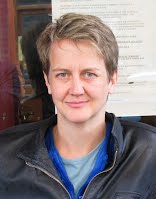Susan Brison Dartmouth College Susan Brison is Chair of the Department of Philosophy at Dartmouth College, where she also teaches in the Women's and Gender Studies Program. She has held visiting positions at Tufts, Princeton, and NYU, and was a Mellon Fellow in Law, Philosophy, and Social Theory at NYU and a Member of the School of Social Science at the Institute for Advanced Study in Princeton. The overarching themes of Brison’s work—on topics ranging from mental representation to free speech theory to sexual violence—have been anti-individualism and a defense of the relational self. After completing her Ph.D. dissertation, Do We Think in Mentalese? A Critique of the Language of Thought Hypothesis, Brison brought her background in philosophy of mind and philosophy of language to bear on issues in ethics and in social, political, and legal philosophy. In a series of articles and a forthcoming book on freedom of expression, she exposed and critiqued an implicit mind-body dualism in the legal categorization of harms caused by verbal and physical assaults and argued against the defense of the right to free speech grounded in individual autonomy. In her book, Aftermath: Violence and the Remaking of a Self (Princeton, 2002; Editions Chambon, 2003; C.H. Beck Verlag, 2004), Brison argued for the necessity of first person narratives in theorizing about personal identity and defended an account of the self as an embodied narrative that is socially constructed (and undone and re-constructed) in relation to other selves. Her work in progress includes a coauthored book, Debating Pornography, and a book on the so-called “sex wars” that divided U.S. feminists beginning in the 1970s and continue today in conflicts between feminist theorists and queer theorists over gender-based harassment and violence. Influenced by feminist theory since studying French feminism as an undergraduate and interviewing Simone de Beauvoir, she credits the mentors she met through SWIP (the Society for Women in Philosophy), especially Eva Kittay, Diana Meyers, and Virginia Held, with inspiring and sustaining her work in feminist philosophy. She, in turn, mentors numerous women in philosophy, including those she has met through her work with SWIP, FEAST (the Association for Feminist Ethics and Social Theory) and WPHTF (the Women in Philosophy Task Force). A politically engaged philosopher, Brison grounds her theoretical work in people’s actual experiences and uses her training in philosophy to work for social justice. She is a prominent voice in the anti-rape movement and is active in the struggle for LGBTQ civil rights. Through her scholarly articles and lectures, she has brought greater philosophical attention to the topics of rape and domestic violence, and she has also raised public awareness of gender-based violence through articles in the Sunday New York Times Magazine, The Guardian, The Chronicle Review, and other newspapers and magazines. |
Home > Highlighted Philosophers >

